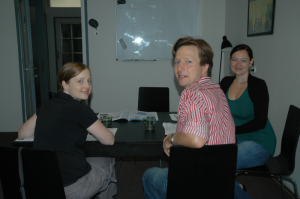“Exaggerate, when you learn new vocabulary,” says Petra – a teacher of Czech for Foreigners at university in Napoli, Italy. We are glad that she was teaching at Study Czech during this summer.
What is the biggest difference in teaching at a university and in our language school?
Petra: For me, the biggest difference is that in university courses, the emphasis is put on grammatical accuracy. Czech is a beautiful language with a rich vocabulary and grammar, so this focus is logical, yet not so important for someone who lives in a foreign country and wants to use the language in everyday life. That’s why I was so pleased that I can teach differently in language school Study Czech – the courses are interactive and topic-based (covering everyday situations in which we need to speak and to be understood), focused mostly on speaking and independent use of the language, because those are the most important things in learning a language as well as in life.
 Why do you enjoy teaching Czech to foreigners?
Why do you enjoy teaching Czech to foreigners?
Petra: There are very many reasons but I’m not going to mention them all. However, one of the main points on the imaginary list of reasons is the meaningfulness of this job. Step by step I help students express themselves, improve their language skills and understand how Czech works and I watch them get better and more self-confident. It’s a joy to see how happy they are about having the Czech Republic as their second home. It’s also very pleasant to watch students become more and more sure of themselves while speaking Czech and I’m happy to be a part of this process that makes their lives easier. Furthermore, with every foreign language we learn our cultural horizons broaden and we subconsciously enhance our personality, no matter what our motivation for studying might be. This is even more true here in Brno. People from various countries and backgrounds meet in courses and together we develop our language, professional and social skills.
Do you have any tips for students on how to learn and master Czech that you could share with us?
Petra: Two things came to my mind. First regards pronunciation. Learn new words and phrases by saying them aloud. Exaggerate! Pronounce the long vowels really long and let each sound resonate. It’s an efficient way to get used to the sounds of the words and pronounce them correctly when speaking to strangers in the street. Maybe you are wondering now why you should pronounce words differently at home and in the street? The reason is obvious. When we speak a foreign language we don’t focus on pronunciation that much because we concentrate on other things. We think about what we want to say so there is no time left for pronunciation, or we feel embarrassed because we think that long vowels sound funny, or we are simply afraid to speak. If we learn a word by saying it aloud, we won’t be afraid that we won’t pronounce it correctly. We’ll hear it in our head and we’ll remember how nicely it sounded when we said it aloud at home. We’ll also be more self-confident while writing because we’ll know over which letters the diacritics, háček and čárka (or caron and acute accent, if you will), belong. And this is closely connected with the second, and more important, tip. Don’t be afraid to speak! Don’t worry, even if you’re beginners and not so sure about your Czech. Make mistakes! You won’t avoid making them anyway :) Making mistakes when speaking a foreign language isn’t embarrassing, on the contrary! Your efforts will be appreciated by others.
Thank you, Petra, for your answers and help!


